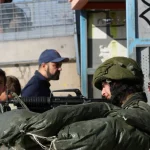A Railway Protection Force officer shot dead the three Muslims and a Hindu colleague and hailed PM Narendra Modi after the killings.
New Delhi, India – Three days after Asgar Abbas Ali was shot dead inside a train along with three others by a railway guard, his brother, Mohammad Sanaullah, is still unable to process the loss.
Since Monday’s killings, neighbours have been gathering at their house in Bisfi village of eastern Bihar state’s Madhubani district to show solidarity with the bereaved family.
“What had my brother done to deserve this? He was a simple man and never troubled anyone,” said Sanaullah, 35, his voice over the telephone breaking.
Nearly 1,200km (750 miles) from his home, Ali, 48, had boarded a train for Mumbai, the sprawling capital of Maharashtra state, on the evening of July 30 from Jaipur, the capital of neighbouring Rajasthan state in western India.
The next morning, when the train reached Palghar, a town outside Mumbai, a 33-year-old armed guard from the Railway Protection Force (RPF) went on a rampage, allegedly killing three Muslim men and his Hindu colleague.
According to witnesses, the accused, RPF constable Chetan Singh, first fired his service rifle at his senior colleague, RPF Assistant Sub-Inspector Tikaram Meena. Then he shot two passengers, Abdul Kadar Mohammed Hussain Bhanpurwala and Syed Saifuddin, in the train’s pantry coach.
Ali was the last target, whom he shot dead in another compartment.
After his fourth murder, Singh, according to a chilling video that showed a bleeding Ali lying next to his feet, hailed Prime Minister Narendra Modi and Uttar Pradesh state’s hardline chief minister, Yogi Adityanath – both members of the ruling Hindu nationalist Bharatiya Janata Party (BJP).
‘An act of terror’
The family members of the Muslim men, activists and opposition politicians have called the incident “a hate crime” and “an act of terror”.
Mohammad Ziauddin, the village head in Bisfi, told Al Jazeera the incident was a result of the hate “being spread by the media and people associated with the BJP and the RSS”.
RSS refers to the Rashtriya Swayamsevak Sangh (or National Association of Volunteers), the ruling BJP’s far-right ideological mentor that aims to create an ethnic Hindu state in the world’s most populous country.
India is home to more than 200 million Muslims – the third largest concentration of the community after Indonesia and Pakistan.
“We have seen the video. It is obvious that this man was driven by hatred for Muslims. We lost our brother to hate,” Ziauddin, 55, told Al Jazeera.
He said he had known Ali since their childhood and described him as a “polite man”.
Ali, a father of three daughters and a son, sold bangles in Jaipur, where he had shifted last year in search of a better livelihood.
“He was a hardworking and honest man, but it did not yield him much,” said Kaleem-ud-Din, his brother-in-law.
According to Sanaullah, Ali’s bangle business was struggling and he was exploring new avenues. He was on his way to Mumbai to join a mosque in the city as a muezzin, who proclaims the call to prayer.
Village head Ziauddin demanded compensation for Ali’s family, saying the government should take care of the education of his children and provide a job to a family member.
‘Can’t believe had to bury my friend’
Unlike Ali, the condition of Kadar, a 64-year-old Muslim from the Bohra Shia sect, was relatively better.
Kadar had been living with his family in Nalasopara, about 58km (36 miles) from Mumbai, for the last 25 years where he ran a shop selling household products.
Originally from Bhanpur in the central Indian state of Madhya Pradesh where he had gone to observe Muharram, Kadar boarded the same train in Bhawani Mandi, a town in Rajasthan state about 18km (11 miles) from Bhanpur.
Kadar’s childhood friend Lukman Bhanpurwala, who owns a motor garage in Nalasopara, described him as a “simple man who would never fight with anyone”.
He said they were close friends and would meet nearly every week despite their busy lives.
“I cannot believe I had to bury my friend in a grave. We were laughing together just last week,” Lukman told Al Jazeera.
Kadar had studied till 12th grade before he quit education and started earning for his family. He is survived by his wife, two sons, a daughter-in-law and a grandson.
“I don’t know what to say. I am devastated. My father worked hard to give us good education,” said Kadar’s eldest son Hussain Kadar, 36, who works in Dubai.
‘Targeted for his beard’
Singh’s third Muslim victim, Saifuddin, 43, had big dreams for his daughters, his brother Syed Younus told Al Jazeera. “He wanted his daughters to become doctors.”
Singh, according to media reports, forced Saifuddin at gunpoint to leave his seat and follow him to the pantry coach where he shot him dead.
Saifuddin was returning to Mumbai from Ajmer, a town in Rajasthan famous for the shrine of 12th-century Sufi saint, Khwaja Moinuddin Chishti.
From Mumbai, he was scheduled to board another train to Hyderabad, a large city in southern India where he ran a business repairing mobile phones for the last 12 years.
Originally from Bidar, a small town in neighbouring Karnataka state, Saifuddin is survived by his wife, Anjum Shaheen, and three daughters, the youngest of whom is just six months old.
The families of all three victims are demanding strict punishment for Singh.
“The man in uniform who killed our brother did not know him personally. He targeted him for his beard. He was filled with hate for Muslims,” Saifullah’s brother Younus told Al Jazeera.
In a post on X, the social media platform previously known as Twitter, Asaduddin Owaisi, a prominent Muslim parliamentarian from Hyderabad who said his party is assisting Saifuddin’s family, condemned Prime Minister Modi for maintaining silence on the killings.
“You have not even condemned the attack; forget expressing sympathies for their families. Is it because the terrorist [accused Singh] asked people to vote for you?” Owaisi asked.


